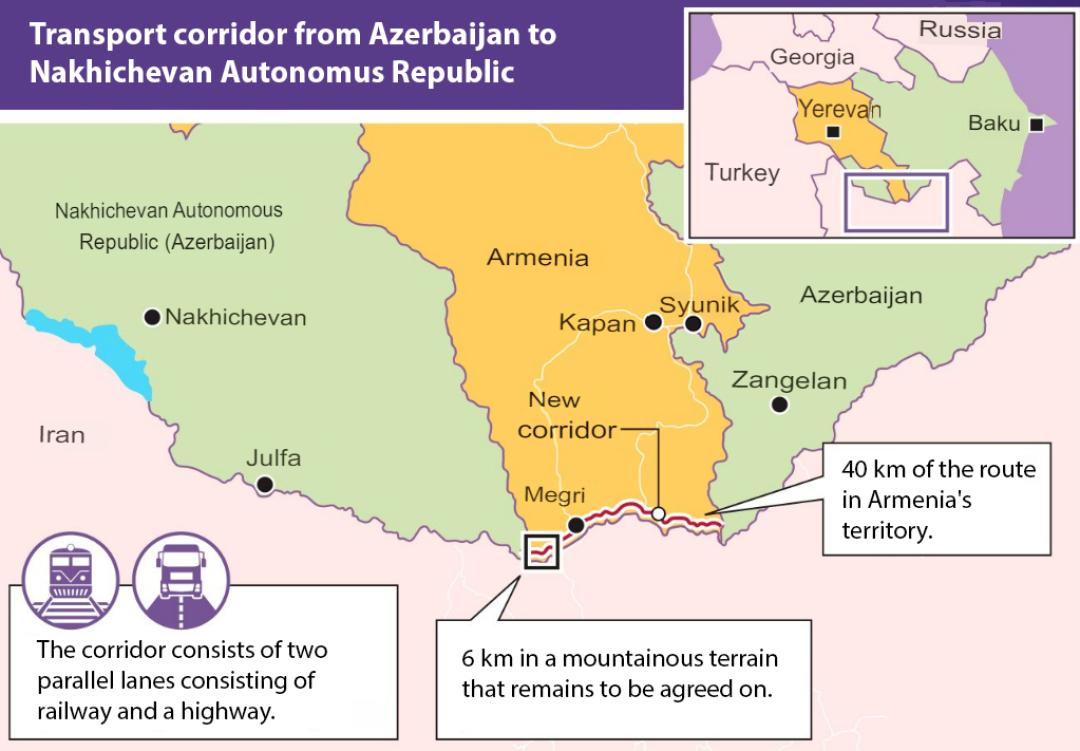
Connectivity in the Caucasus: A Thorny Issue for Russia and Iran

Iran and Russia remain close but increasingly disagree when it comes to connectivity in the South Caucasus. This demonstrates the limits of their otherwise successful partnership in military and security affairs. Iran has a new president, Masoud Pezeshkian, who wants to usher in a new period in the country’s foreign policy. This includes normalization of ties with the West over the country’s nuclear program to alleviate a difficult economic situation. Furthermore, Pezeshkian wants to follow what his predecessor, the late Ebrahim Raisi, pursued, namely, normalizing ties with neighbors such as Saudi Arabia, other Arab countries, and Azerbaijan in the South Caucasus.
In terms of much bigger issues, such as relations with Russia and China, the Islamic Republic of Iran’s foreign policy will largely remain the same. Pursuit of closer economic, investment, and military ties is Tehran’s primary goal, allowing the country to diversify its economy and minimize the negative effects of the Western sanctions. The dynamics of Russia-Iran relations clearly demonstrate this. The two are reportedly planning to sign a major interstate agreement later this year on the sidelines of the BRICS+ summit in Kazan. Military cooperation runs full steam ahead, with recent reports emerging that Iran allegedly sent ballistic missiles to Russia and served as an intermediary for expanding cooperation between Moscow and the Houthis in Yemen.
Yet not all is well in the relations between Moscow and Tehran. Syria, where the two countries are actively present, remains a thorny issue. The South Caucasus is another theater for potential disagreement. Indeed, Tehran has recently experienced discomfort over Russia’s position on the South Caucasus, where Azerbaijan wants to build a corridor through Armenia’s southernmost province of Syunik. Iran is concerned that the establishment of a Turkic corridor connecting Turkey to Azerbaijan and the Caspian Sea could pose challenges for its northern provinces, primarily home to ethnic Turkic-speaking peoples. More importantly, Iran is worried that a corridor through Armenia will limit the connection with this country, through which the Islamic Republic aims to reach Georgia and its Black Sea ports.
Therefore, when Russia in early September once again raised the issue of the corridor, Iranian politicians and political commentators were notably exasperated. This led to Tehran summoning the Russian ambassador to Iran, as well as uncomfortable exchanges with the Russian side, which tried to tone down the tensions. The incident has once again highlighted that despite close cooperation between Iran and Russia, they often have conflicting interests, whether it is in the Middle East or the South Caucasus. Moscow promptly mitigated the tensions by arguing that it managed to reach Tehran’s understanding on the issue.
The development of necessary infrastructure, such as roads and bridges, is likely to materialize the existing agreement between Tehran and Baku on a circuitous route from Azerbaijan proper to Nakhchivan via Iran's northern territories. There is simply too much at stake for the Islamic Republic, and it will not abandon its national interests irrespective of which president runs the country. Iran also has plenty of instruments up its sleeve. It could ratchet up its support for Armenia, pressure Azerbaijan through military drills near the common border, and signal to Russia that the blossoming military cooperation has limits in case Moscow continues with its stance on the so-called Zangezur corridor. On its part, the Kremlin is unlikely to push Iran into the corner – bilateral cooperation is too important for Moscow.
Both could equally concentrate on positive developments. Indeed, not all issues related to connectivity in the South Caucasus are problematic. Russia and Iran have successfully cooperated in the development of the International North-South Transport Corridor, which partially goes through Azerbaijan and connects Russia’s ports with Iran and potentially India.
Moreover, Tehran and Moscow are unlikely to allow their relations to slip because of the differences in the South Caucasus. While the region holds significance, it is not central to Tehran and Moscow's geopolitical alignment. Despite the ongoing distrust between Tehran and Moscow, their shared opposition to the collective West serves as their motivation. This is well reflected in their approval of the so-called 3+3 initiative, which unites three South Caucasus countries plus Turkey, Iran, and Russia themselves. The format has an explicit goal – limiting the Western influence in the region.
It is noteworthy that Iran’s foreign policy under the new president is unlikely to experience tectonic shifts, but there already are different tactical plays that indicate that some changes are to happen. Tehran will pursue its core strategic interests as demonstrated in Armenia, but will also be more open to reaching an agreement with the collective West over its nuclear program. The success of this policy is far from guaranteed, but it shows that the country wants to build a more equidistant foreign policy from each major global actor.
Emil Avdaliani is a professor of international relations at European University in Tbilisi, Georgia, and a scholar of silk roads.





